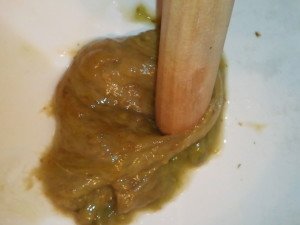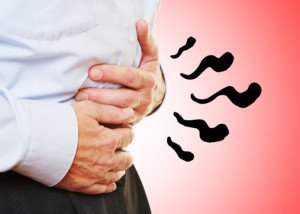
A GI doctor describes benign causes of oily or greasy bowel movements.
Do your stools look slimy, oily or greasy?
If they appear different lately, you should see a gastroenterologist, since only a doctor can determine for sure what the cause is.
“Greasy or oily stools, assuming one is not ingesting mineral oil, etc., is often a sign of fat malabsorption,” says Michael Blume, MD, a gastroenterologist at MedStar Good Samaritan Hospital, Baltimore.
“This can have many causes, including certain infections, as well as small bowel or pancreatic problems.
“Determining the cause often involves taking a detailed history as well as some diagnostic testing.”
What about IBS?
“One needs to differentiate oily looking stools and mucous in the stool,” says Dr. Blume.
“Many people with IBS complain of having mucous in their stools and that their stools look slimy.”
But mucous in the stools is not the issue with the conditions (described below) that cause oily bowel movements.
When stools are oily or greasy, this is called steatorrhea.
Pancreatic Problems
“One usually malabsorbs fat (this is what makes stools oily) if there is a problem with pancreatic function, such as with chronic pancreatitis, or from problems in the small intestine where fats get absorbed, such as with celiac disease, certain infections, such as Giardiasis, small bowel bacterial overgrowth, or other inflammatory diseases.”
One such inflammatory disease is Crohn’s disease.
Benign Causes of Greasy Oily Stools
Benign causes of steatorrhea, or oily stools, often involve dietary factors or non-serious gastrointestinal issues.
One common benign cause is the consumption of high-fat foods or supplements, such as those rich in oils or fats, which can lead to temporary steatorrhea.
You’ll be able to see the “greasiness” in your poops.
Another cause can be the use of certain medications, like those containing bile acid sequestrants, or specific weight loss drugs, which can interfere with fat absorption.
Additionally, rapid gastric emptying, also known as dumping syndrome, can lead to steatorrhea.
This occurs when food moves too quickly from the stomach to the small intestine, leading to insufficient digestion of fats.
Similarly, lactose intolerance can occasionally result in oily stools if the body can’t properly digest dairy products, though it more commonly causes diarrhea and gas.
These benign causes typically resolve with dietary adjustments or discontinuation of specific medications.
Can cancer cause oily stools?
Yes, cancer can lead to steatorrhea.
Pancreatic Cancer: This is one of the most common causes of steatorrhea.
The pancreas produces digestive enzymes that help break down fats.
If pancreatic cancer impairs enzyme production or blocks the pancreatic duct, it can lead to poor fat digestion and absorption, resulting in oily stools.
Biliary Tract Cancer: Cancers affecting the bile ducts or gallbladder can interfere with bile flow.
Since bile is essential for the digestion and absorption of fats, obstruction or disruption in bile flow due to cancer can lead to steatorrhea.
Small Bowel Cancer: Tumors in the small intestine can disrupt the digestive process and lead to malabsorption of nutrients, including fats, causing oily stools.
] In practice for 25+ years, Dr. Blume treats over 65 conditions including abdominal pain, appetite loss, blood in stool, celiac disease, colon cancer, esophageal and liver disease, gas and IBS.
In practice for 25+ years, Dr. Blume treats over 65 conditions including abdominal pain, appetite loss, blood in stool, celiac disease, colon cancer, esophageal and liver disease, gas and IBS.
 Lorra Garrick has been covering medical, fitness and cybersecurity topics for many years, having written thousands of articles for print magazines and websites, including as a ghostwriter. She’s also a former ACE-certified personal trainer.
Lorra Garrick has been covering medical, fitness and cybersecurity topics for many years, having written thousands of articles for print magazines and websites, including as a ghostwriter. She’s also a former ACE-certified personal trainer.









































